Pathways
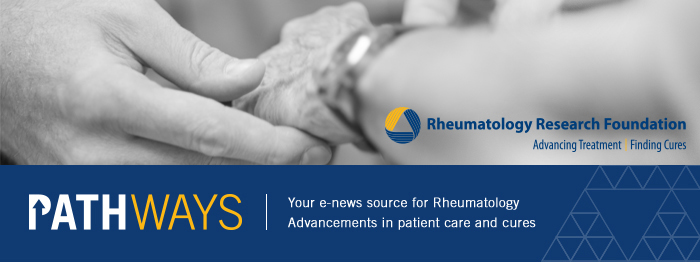
Volume 5 • Issue 4 • April 2016 • Rheumatology Research Foundation
Training Tomorrow's Top Doctors
|
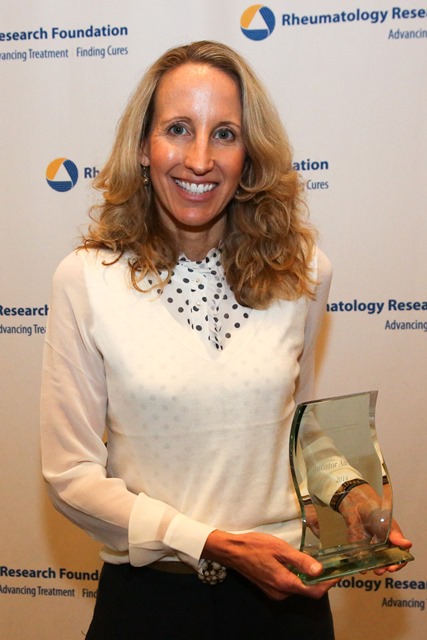 Maria Dall'Era, MD, received the Foundation's Clinician Scholar Educator Award. The funding allowed her to develop an app that exposes medical students and new doctors to rheumatology. Maria Dall'Era, MD, received the Foundation's Clinician Scholar Educator Award. The funding allowed her to develop an app that exposes medical students and new doctors to rheumatology.
|
A passion to improve the clinical reasoning skills of future doctors led Maria Dall’Era, MD, Associate Professor of Medicine and Director of the University of California San Francisco (UCSF) Lupus Clinic to create a revolutionary application for smartphones and tablets that could modernize medical education. With funding from the Foundation’s Clinician Scholar Educator Award, she is developing the app that exposes medical students and new doctors to rheumatology, so that they are better prepared to care for those living with rheumatic diseases.
“Patients want their doctors to be able to piece together complex information and come up with an accurate diagnosis,” says Dr. Dall’Era. “Although modern technology has enabled students to quickly look up facts, the ability to perform clinical reasoning is a skill that needs to be taught and practiced throughout medical education. The ability to think critically and reason through a difficult case is what ultimately defines a great physician.”
Dr. Dall’Era’s app, Practice Improvement Using Virtual Online Training (PIVOT), is a mobile virtual patient simulation that allows medical students to evaluate a virtual patient’s records, view interviews and exams, and order lab tests just as they would in a clinical setting. Students must sort through all of the information, identifying which facts are most relevant, and eventually diagnose the virtual patient. In the process, they use the app to answer open-ended questions, work in a team with other students and receive real-time feedback from their instructor. All of these features can be accessed on a smartphone, which fits the busy life of a medical student.
“I would often find myself answering questions and looking up relevant clinical information on the shuttle between hospital campuses,” says Jamal Saleh, a UCSF medical student who volunteered for PIVOT’s first trial run. “In comparison to our often lecture-based curriculum, PIVOT was highly interactive.”
|
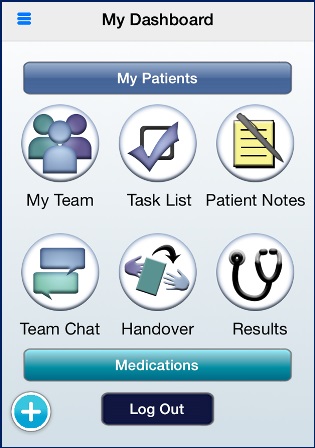 The PIVOT App helps teach the skills needed to better diagnose and care for people with rheumatic diseases. The PIVOT App helps teach the skills needed to better diagnose and care for people with rheumatic diseases.
|
Skills to Better Diagnose Patients
Improving clinical skills is especially important for the diagnosis and treatment of rheumatic diseases since symptoms can differ widely person to person, making diagnosis difficult. More than half of lupus patients suffered for at least four years and saw three or more physicians before getting the right diagnosis. Dr. Dall’Era believes that meaningful education experiences like PIVOT can help reduce that time by introducing future doctors to rheumatic diseases and helping them develop the skills they need to better diagnose patients.
“By working through the case in the app, students will learn about the symptoms and signs of rheumatic diseases, as well as other diseases that mimic rheumatic diseases,” explains Dr. Dall’Era. “Getting exposure to rheumatology is so critical for medical students at this stage of their education.”
Addressing the Shortage of Rheumatologists
Not only is PIVOT helping students to become better doctors in the future, it also has the potential to address the growing shortage of rheumatologists. Dr. Dall’Era hopes that PIVOT can also help spark interest in rheumatology by introducing students to the field through a meaningful and engaging experience.
Saleh says using PIVOT definitely increased his interest in rheumatology. “The case-based nature of the application, which unfolded every day like a puzzle and rewarded you for the time that you put into learning more about each sign and symptom, was academically scintillating and one of the most fun modules I had the chance to use in my medical education.”
|
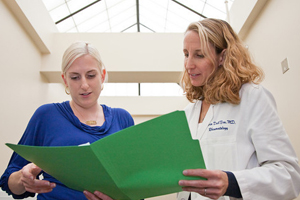 Dr. Dall'Era is the Director of the University of California San Francisco Lupus Clinic. Dr. Dall'Era is the Director of the University of California San Francisco Lupus Clinic.
|
Building Excellent Educators
Dr. Dall’Era says that she is incredibly thankful for her Foundation funding, which has not only allowed her to build PIVOT, but also granted her opportunities to improve her skills as an educator. After receiving the Foundation’s Clinician Scholar Educator Award, she was accepted into UCSF’s rigorous Teaching Scholars Program, which teaches educators about curricular development and educational theory and methodology. She believes the Foundation grant was a key component of her acceptance into the program and is applying her expanding knowledge to PIVOT and her career as a professor.
“It is our responsibility to teach the next generation of doctors, who will take care of rheumatology patients and do research to find the underlying causes of these diseases,” Dr. Dall’Era says. “The Foundation allows people like me to work in the academic environment. The Foundation believed in me, and as a result, I have been able to pursue additional formal training in education, which I am applying to the development of this novel educational app.”
A Platform for the Future
In fall of 2015, Dr. Dall’Era tested PIVOT with the help of 140 students as part of UCSF’s second year medical school curriculum. She hopes to gain valuable feedback from the trial, so she can develop PIVOT further and bring it to other levels of learners and medical school curriculums across the country.
“A lot of this work is building a platform for the future. This app can be scaled up and we can create cases that end in different diagnoses,” says Dr. Dall’Era. “We plan to formally analyze the data we collect from the use of PIVOT so that we can understand how we are influencing students’ clinical reasoning skills. We will use what we learn to continue to improve the app over the course of time. In the end, we hope to produce better doctors who are able to take the best possible care of their patients.”
There are many ways to give to the Rheumatology Research Foundation, and all support the Foundation’s work to improve the health of people with rheumatic diseases. In this “How I Give” series, we will feature the rheumatologists, rheumatology health professionals, patients, family, and friends who are essential to the Foundation’s work. Please visit the ways to give page to learn more about how you can get involved with the Foundation, or share your story by emailing us.
How He Continues to Give: Ephraim P. Engleman, MD
|
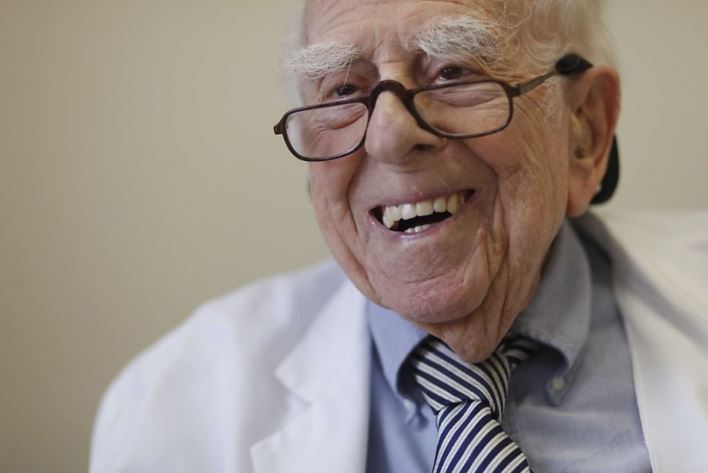 Dr. Engleman's contribution has allowed new doctors to gain valuable research experience in rheumatology. Dr. Engleman's contribution has allowed new doctors to gain valuable research experience in rheumatology.
|
The late Ephraim P. Engleman, MD, was the first individual to endow an award at the Foundation. His contribution established the Ephraim P. Engleman Endowed Resident Research Preceptorship, which introduces new doctors to rheumatology by supporting a full-time research experience. Since the award’s inception, it has funded 12 promising physician-scientists and inspired other individuals to establish endowments and support awards at a major-level.
Executive director of the Foundation, Mary Wheatley, IOM, CAE, says, “Dr. Engleman is a legend to the field of rheumatology. His investment in the Ephraim P. Engleman Endowed Resident Research Preceptorship has not only encouraged more new doctors to pursue rheumatology, but it has also inspired other leaders to establish new endowments and awards. We are forever grateful for his commitment to the Foundation and its mission to improve the health of people living with rheumatic diseases.”
Dr. Engleman, who passed away in September of 2015, is widely regarded as one of the founders of the modern practice of rheumatology and the investigation of its diseases. He led the National Commission on Arthritis in the mid-1970s, a congressionally mandated task force charged with suggesting remedies for the inadequate status of arthritis research, teaching and patient care in the U.S., resulting in creation of what is now the National Institute of Arthritis and Musculoskeletal and Skin Diseases (NIAMS). He is the founding Director of the Rosalind Russell Medical Research Center for Arthritis at the University of California San Francisco (UCSF) which has attracted major contributions from private individuals, enabling it to help underwrite numerous research initiatives.
A past president of the American College of Rheumatology (previously known as the American Rheumatism Association), Dr. Engleman has received numerous awards denoting his distinguished career in rheumatology, including the ACR’s Presidential Gold Medal, which is the highest national honor in the field of rheumatology. He is also the recipient of the prestigious Gold Medal from Columbia University College of Physicians and Surgeons, and UCSF’s Medal of Honor, the institution’s highest honor.
This past year, Dr. Engleman was inducted onto the Foundation’s Honorary Board of Advisors, an honor reserved for individuals who have made a transformative contribution, either through monetary support and/or act of leadership.
Click here to view a video that highlights Dr. Engleman's extraordinary commitment.